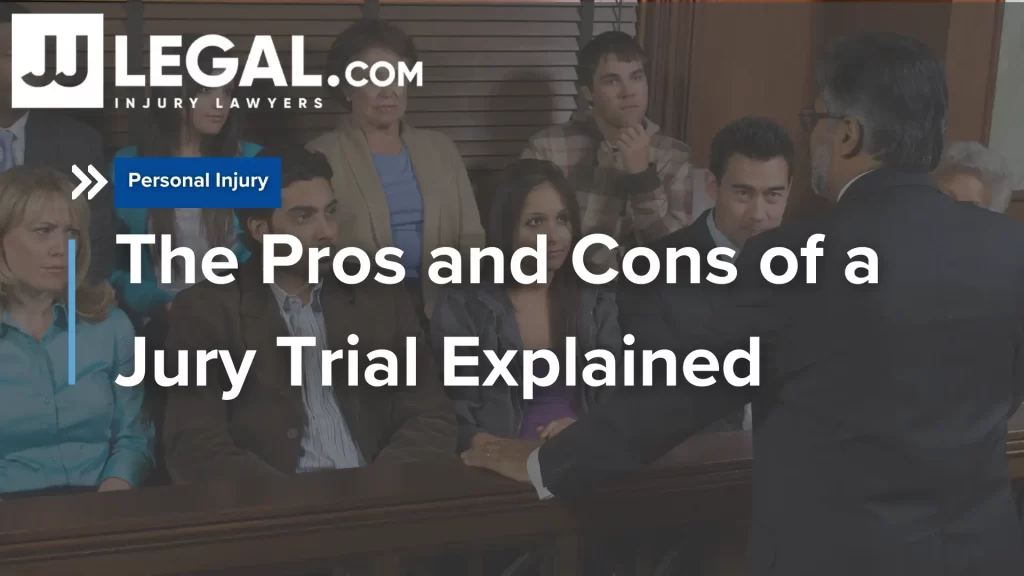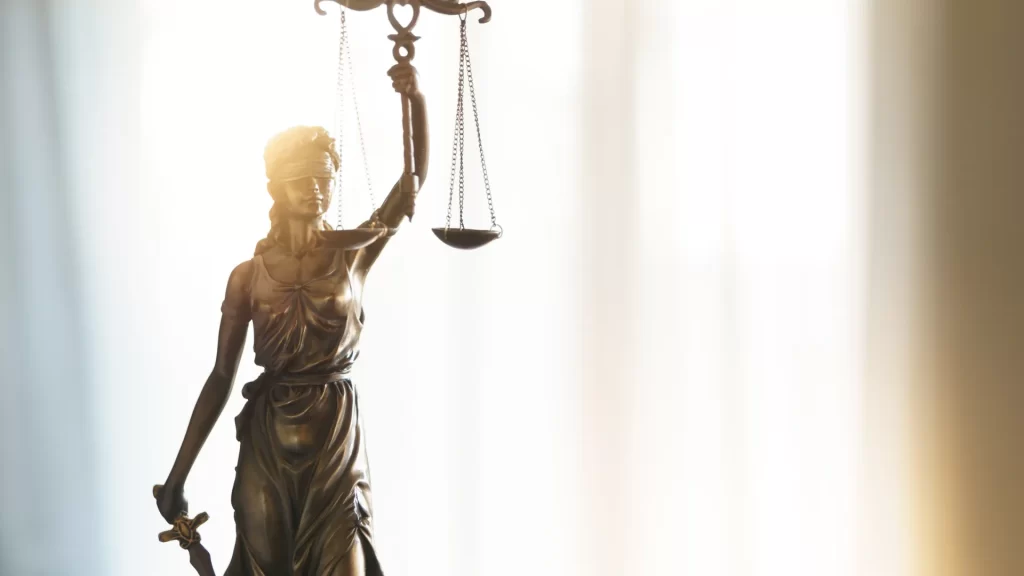
If you’re potentially facing trial, you’ve likely wrestled with the choice between a jury of your peers or the singular judgment of a seasoned judge. This critical decision hinges on the pros and cons of a jury trial. Simplified, a jury offers diversity of thought but can bring bias, while a judge brings legal precision but may lack the human touch. Here, we’ll explore these critical differences to help you pinpoint which trial type best fits your case.
Understanding Jury Trials: The Essence of the Jury System
Jury trials are deeply woven into the fabric of democratic societies. They serve as a vehicle for public participation in the justice system, where a group of citizens is entrusted with the responsibility of adjudicating a criminal case. The key distinction between a jury and a bench trial lies in who makes the verdict – a group of jurors or a single judge.
It is crucial to grasp the essence of the jury system before delving into the pros and cons of a jury trial.
The Role of Juries in Criminal Justice
Juries hold a unique position in the criminal justice system. They serve as a bridge between the law and the public, evaluating evidence and delivering verdicts in criminal cases. The primary role of a jury is to deliver an unbiased verdict based on the evidence presented during the trial.
The jury’s decision, therefore, determines whether a defendant is guilty or not, ultimately leading to a guilty verdict, acquittal, or in some cases, a hung jury. The responsibility resting on the shoulders of jurors is immense, underscoring the importance of their role in delivering justice.
The Process of Selecting Jurors
The credibility of a jury trial hinges significantly on the impartiality and representativeness of the jury members. The selection process aims to constitute a jury that is a reliable cross-section of the community. The process begins with a qualification questionnaire, followed by voir dire, where potential jurors are questioned by the judge and attorneys to assess their suitability and detect any biases. Once selected, the jurors then proceed to the jury room for further deliberations.
Attorneys have the privilege of excluding potential jurors using peremptory challenges, but these must not be discriminatory. This meticulous process is designed to ensure a fair and unbiased jury, contributing to the legitimacy of the jury system.
Importance of Jury Instructions
Once the jury is seated, they are not left to navigate the trial process alone. The judge plays a pivotal role in guiding the jury by providing jury instructions. These instructions are crucial in delineating the pertinent laws the jury must abide by during the trial. The judge’s role extends to making decisions on which evidence the jury may consider and explaining the implications of the evidence and the jury’s duties.
These instructions serve as a compass for jurors during deliberation, ensuring they adhere to the law and the specifics of the case at hand.
Advantages of Opting for a Jury Trial
Turning our attention to the pros and cons of a jury trial, it’s worth noting that the founding fathers intentionally established the jury trial in the Bill of Rights. They understood the importance of public confidence in the justice system and the need to protect individual liberties from the risk of government oppression.
Notwithstanding the complexities of the jury trial process, it holds certain advantages over a bench trial that make it a preferred option in some cases.
Collective Wisdom: Strength in Numbers
One significant advantage of a jury trial is the collective wisdom it brings to the table. With numerous jurors involved, a variety of perspectives are considered, potentially leading to a more balanced judgment than a single judge could provide.
A jury trial benefits from the diverse perspectives, life experiences, and insights that jurors contribute, ensuring a more balanced and fair consideration of the case. This strength in numbers is a unique aspect of jury trials, often making them a preferred choice in certain cases.
Emotional Resonance: When Empathy Matters
In addition to collective wisdom, another advantage of jury trials lies in their potential for emotional resonance. Jurors, being ordinary citizens, may be more amenable to emotional arguments and personal appeals in arguments or testimony. This emotional aspect can favor the defendant, as jurors may decide based on compassion rather than legal evidence alone. It’s important to remember, however, that such emotional influence can also lead to bias or partiality.
The demeanor and behavior of the defendant during the trial can also significantly shape how jurors perceive the case and ultimately decide the verdict.
Disadvantages of a Jury Trial
While weighing the pros and cons of a jury trial, it’s essential to consider both sides of the argument. While jury trials offer distinct advantages, such as community representation and diverse perspectives, they also have their fair share of drawbacks. Recognizing these disadvantages is crucial when deciding the best course of action for your case. From potential emotional influence to lengthy delays, these factors can adversely affect the outcome of a jury trial.
Time Constraints and Delays
One common problem associated with jury trials is the potential for significant delays. The jury selection process can become complex and time-consuming, especially in cases with significant publicity. Additionally, jury instructions aimed at motivating continued deliberation may prolong the period of jury deliberation, particularly when a unanimous decision is hard to reach.
While there are specific time limits outlined in the law for the stages of a jury trial, exceptions can extend these time frames, potentially causing delays.
The Risk of Bias and Prejudice
Another notable disadvantage of jury trials is the risk of bias and prejudice. Despite measures taken to ensure impartiality, jurors’ personal beliefs or experiences can introduce bias into the decision-making process. Moreover, the process of voir dire, used to screen jurors for potential biases, may be insufficient in removing those with implicit biases, potentially leading to unequal outcomes and discrepancies in verdicts and sentencing.
Bench Trials: A Comparative Look
In contrast to jury trials, judge trials, also known as bench trials, present a different dynamic. In these trials, the judge assumes the role of both judge and jury, acting as the sole arbiter of fact and law.
While bench trials may seem less democratic, they can offer certain advantages over jury trials, particularly in criminal trials with complex legal issues that require thorough trial preparation.
Judge’s Expertise in Legal Matters
One of the most significant advantages of a bench trial is the judge’s expertise in legal matters. Unlike jurors who often lack legal training, judges are equipped to handle the intricacies of complex legal matters. This can be particularly beneficial in cases involving complex legal issues, where the judge’s expertise can provide a more informed decision.
Understanding the potential benefits of a judge hearing in a bench trial can guide your decision-making process.
Expediency and Focus on Law
Another advantage of bench trials is their potential for expedience and a strict focus on the law. Judges in bench trials can streamline the trial process by reserving ruling on evidentiary and legal issues for their final decision. Additionally, trained judges are able to look beyond superficial matters, ensuring that trials are focused strictly on the law. Understanding these advantages can help you make an informed decision when choosing between a jury trial and a bench trial.
Making an Informed Decision: Jury Trial or Bench Trial?
Selecting the appropriate trial type is not a decision to be taken lightly. Jury and bench trials have pros and cons. The best choice depends on your case specifics. Factors such as:
- the complexity of the case
- the potential for bias
- time constraints
- the potential emotional resonance of your case
should all be considered.
Evaluating Your Case
Evaluating your case is a crucial first step in deciding between a jury trial and a bench trial. The strength of evidence, including physical proof such as X-rays, can significantly influence a judge’s or jury’s perception of the case and whether there is reasonable doubt.
Lost wage claims require careful scrutiny for legitimacy and can impact the trial type. Understanding compensation structure is crucial when preparing for how such claims may be received.
Contact a Chicago Personal Injury Attorney

Once you have evaluated your case, it’s essential to consult with your attorney. At JJ Legal, our Chicago personal injury attorneys are available to offer the compensation you deserve regarding trial options in criminal law. Our team can help you decide whether a jury trial or bench trial is more suitable by considering the specific details of the case and the legal strategies involved.
Choosing between a jury trial and a bench trial is complex. Jury trials offer public participation and emotional resonance but may face delays and bias. Bench trials are streamlined and benefit from a judge’s legal expertise, but may lack the representativeness of a jury verdict.
Learn more about how we can help by contacting us online or calling us at312-200-2000 for a free case review.
Related Posts:
- Personal Injury Deposition Preparation Guide
- When and When Not To Accept An Insurance Settlement Offer
- Social Media Impact on Personal Injury Cases
- Trial Lawyer Role in Personal Injury Cases
Frequently Asked Questions
What is the main difference between a jury trial and a bench trial?
In a jury trial, the verdict is decided by a group of jurors, while in a bench trial, it is determined by a single judge. This is the main distinction between the two trial types.
Why might someone opt for a bench trial over a jury trial?
Someone might opt for a bench trial over a jury trial in cases involving complex legal matters, where a judge’s expertise can provide a more informed decision.
What are some disadvantages of a jury trial?
Some disadvantages of a jury trial include potential delays and the risk of bias and prejudice, which can affect the outcome of the case.
What are the advantages of a jury trial?
A jury trial offers the benefit of harnessing the collective wisdom and potential emotional connection of the jurors, leading to a well-rounded decision.
How can I make an informed decision about the type of trial to choose?
To make an informed decision about the type of trial to choose, evaluate your case thoroughly, understand the pros and cons of each trial type, and consult with your attorney.



